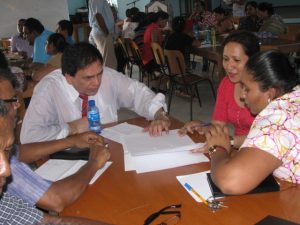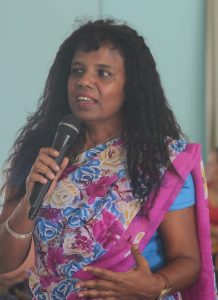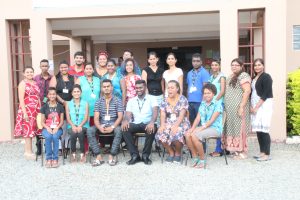Sub-Strategic Plan Evaluation Training Session

Figure 1 Vice-Chancellor Professor Misir with staff, explaining the importance of sub-sub strategic plan.
Strategic plan is an important aspect in the University and it is vital that staff is made aware of its purpose, says Vice-Chancellor, Professor Prem Misir.
Speaking at the strategic plan evaluation training session for staff of the University, Prof Misir highlighted different aspects of strategic planning and how these aspects will help develop a better sub-strategic or sub-sub-strategic plan.
“It’s really a way of trying to show the location of the evaluation process and that location is ground zero. Many people think that the strategic plan is evaluated but instead it is the specific plans which come under the sub-sub strategic plans, which is evaluated. We are trying to find out whether there is a coordinated link among the strategic priorities, goals, objectives (which need to measurable), strategies, Key Point Indicators (KPIs) and the targets,” he said.
Mr Neeraj Sharma, of the Computer Science and IT Department said that it was important to know how to create a sub-strategic or sub-sub-strategic plan as this would act as a to-do-list where in 5 years, one should forecast where the department or school would stand.
“Another important aspect highlighted by the VC was in regards to reviewing, usually, strategic plans are reviewed on a quarterly basis but since this is a new initiative it is important to review it on a monthly basis to see the progress of the goals set out,” he commented.
He further stated that the workshop was quite helpful in guiding them to creating the sub-strategic and sub-sub strategic plans using the right matrix.
“It is important to follow the outline in order of the strategic priority as this will highlight the important things that need to be achieved within the 5 year period,” he said.
Ms Sanjaleen Prasad said that the deliberation created awareness on the 3 key challenges confronting higher education, that is, impact of new communication, research and teaching technologies, the need to change the traditional academic structure and seeking adaptive and flexible links between the University, industry and the economy.
“The sub strategic plan can be further modified to incorporate the three pillars mentioned and these are interdisciplinary, internalization and academic industry collaboration. The School and Department Strategic Plans can focus on these and provide a pathway towards achieving these for the University to flourish and grow further in the next five years,” she explained.
After the discussion it was decided that there would be monthly evaluations of the sub-strategic and sub-sub strategic plans.










